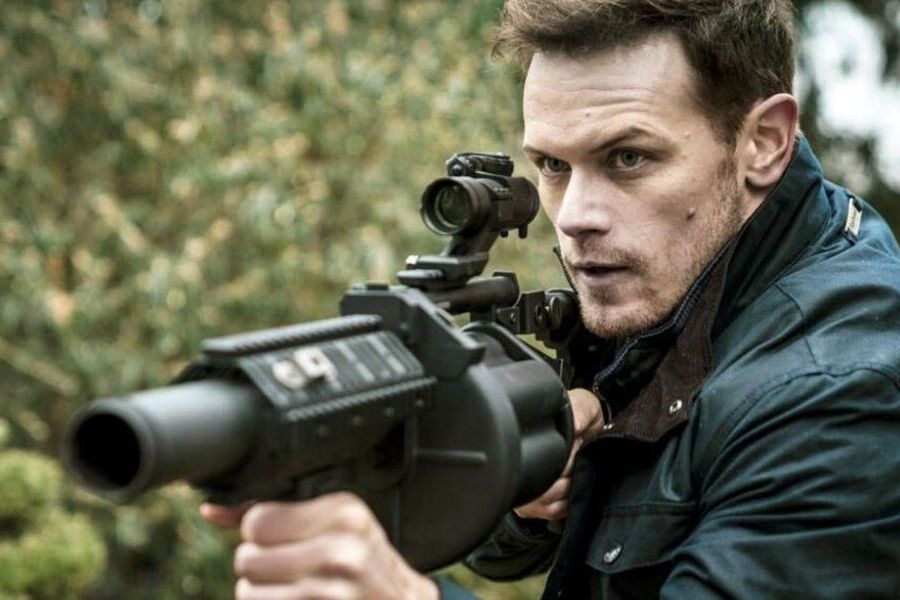‘SAS: Rise of the Black Swan’ or ‘SAS: Red Notice’ is an action film directed by Magnus Martens (‘Jackpot’). It tells the story of the British Special Air Service operative Tom Buckingham (Sam Heughan), who discovers that a disgruntled and dangerous mercenary group called the Black Swans has taken control of the train in which he is traveling to Paris with his girlfriend, Dr. Sophie Hart (Hannah John-Kamen). The leader of the Black Swans, Grace Lewis (Ruby Rose), has meticulously planned the operation, choosing to execute it inside the Channel Tunnel underneath the English Channel.
Beyond the non-stop action, the film explores the psychology of the covert operatives. It also offers a rare glimpse into the harrowing reality of modern geopolitics, where governments can get away after killing hundreds to secure resources. If these aspects of the film have made you wonder whether it is based on actual events, this is what you need to know.
Is SAS: Rise of the Black Swan Based on a True Story?
No, ‘SAS: Rise of the Black Swan’ is not based on a true story. However, it does contain certain realistic elements. The film is the cinematic adaptation of the 2012 novel ‘Red Notice’ by British author Andy McNab, which is the pseudonym of Steven Billy Mitchell, CBE, DCM, MM, a now-retired SAS operative. ‘Red Notice’ is the first book in the ‘Tom Buckingham’ series, which also includes ‘Fortress’ and ‘State of Emergency.’

According to Heughan, when Laurence Malkin was writing the script, he must have thought about John McClane, along with James Bond and Jason Bourne, but ultimately, the film is much more authentic than the projects about the aforementioned characters as it is based on the things that McNab experienced during his tenure in the SAS.
McNab first drew public attention when he put out the 1993 book ‘Bravo Two Zero,’ offering his own (partly fictional, if reports are to be believed) account of a mission that he participated in as a member of an eight-man SAS patrol, whose call-sign was the same as the book’s name, in Iraq during the First Gulf War in January 1991. McNab has since published numerous fictional and non-fictional works. He reportedly wrote at least some of them with the help of a ghostwriter.
Despite being a quintessential military action movie, ‘SAS: Rise of the Black Swan’ doesn’t particularly glorify war or even nationalism. Instead, it devotes itself to portraying the reality behind the everyday luxuries that we take for granted. In the opening scenes, the British government authorizes the killings of villagers in the Republic of Georgia after they refuse to move and let a British company build a gas pipeline through their lands. The government then goes after the Black Swans after finding out a girl from the village has recorded the incident and put the video on the internet because they don’t want to be implicated in genocide. As the illusions of good and evil continue to disappear in modern geopolitics, people learn that this profound apathy is not a matter of fiction but a disturbing reality.
Perhaps, this relates to the other main theme of the film: psychopathy. Tom is a psychopath, and it seems that he has come to accept it. The film depicts how a soldier needs those particular traits to be successful at what they do. Both Tom and Grace have them and recognize that aspect of each other. Following this line of thinking, we can conclude that the British Prime Minister Atwood (Ray Panthaki) and Tom’s boss, George Clements (Andy Serkis), also possess those traits, because otherwise they wouldn’t have ordered the Georgian village to be destroyed and all its male residents to be killed. Because of all this, it’s understandable if someone thinks ‘SAS: Rise of the Black Swan’ is based on a true story, but it’s clearly not the case.
Read More: SAS: Rise of the Black Swan (SAS Red Notice) Ending, Explained


You must be logged in to post a comment.